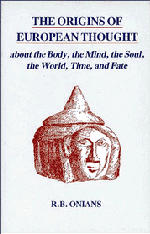Book contents
- Frontmatter
- Contents
- Preface to the first edition
- Preface to the second edition
- Introduction: The Earliest Greeks
- PART I THE MIND AND THE BODY
- PART II THE IMMORTAL SOUL AND THE BODY
- Chapter I The ψυχή
- Chapter II The Genius, Numen, etc.
- Chapter III Anima and Animus
- Chapter IV The Knees
- Chapter V The Strength
- Chapter VI The Stuff of Life
- Chapter VII River-Worship and some Forms of the Life-substance
- Chapter VIII The World: Beginnings of Greek ‘Philosophy’
- Chapter IX Death and Cremation
- Chapter X The Offerings to the Dead and to the Gods
- Chapter XI Nectar and Ambrosia
- PART III FATE AND TIME
- ADDENDA
- Indexes
Chapter V - The Strength
Published online by Cambridge University Press: 06 August 2010
- Frontmatter
- Contents
- Preface to the first edition
- Preface to the second edition
- Introduction: The Earliest Greeks
- PART I THE MIND AND THE BODY
- PART II THE IMMORTAL SOUL AND THE BODY
- Chapter I The ψυχή
- Chapter II The Genius, Numen, etc.
- Chapter III Anima and Animus
- Chapter IV The Knees
- Chapter V The Strength
- Chapter VI The Stuff of Life
- Chapter VII River-Worship and some Forms of the Life-substance
- Chapter VIII The World: Beginnings of Greek ‘Philosophy’
- Chapter IX Death and Cremation
- Chapter X The Offerings to the Dead and to the Gods
- Chapter XI Nectar and Ambrosia
- PART III FATE AND TIME
- ADDENDA
- Indexes
Summary
If the knees get their name and their sanctity thus, there still remains to be explained the belief that in them in a special degree is the strength. In weariness or exhaustion the limbs (? ‘joints’, γυῑα) ‘are loosed’, the knees are ‘impaired’ (βλάβεται) or ‘heavy’. Feelings in the knees are not adequate to account for the belief; and in the passage quoted Hesiod seems to imply that the strength is in the liquid there which is also the seed. He and other early poets characterise sexual love as ‘loosing the limbs’ (λυσιμελής) and, as biologist, Aristotle observed that ‘the enfeebling (“loosing, relaxing”, ἔκλυσις) consequent upon the issuing of even very little of the seed is conspicuous’. That the strength is in the seed and has its source in the source of the latter seems to be implied by the Latin use of vires and virus (cf. vir). The same notion appears (p. 196) in ancient Hindoo thought, among the Zulus and elsewhere. In the Zohar of the Hebrew Kabbalah it is said that in the testes ‘are gathered all the oil, the dignity and the strength of the male from the whole body’. This conception of the seed as oil will explain the practice of ‘anointing’, infusing oil into, kings, i.e. as a begetting, a bestowing of new life, divine life, and is of vital importance for an understanding of the belief that Jesus was not only the king of the Jews but also divine, the son of God.
- Type
- Chapter
- Information
- The Origins of European ThoughtAbout the Body, the Mind, the Soul, the World, Time and Fate, pp. 187 - 199Publisher: Cambridge University PressPrint publication year: 1988

